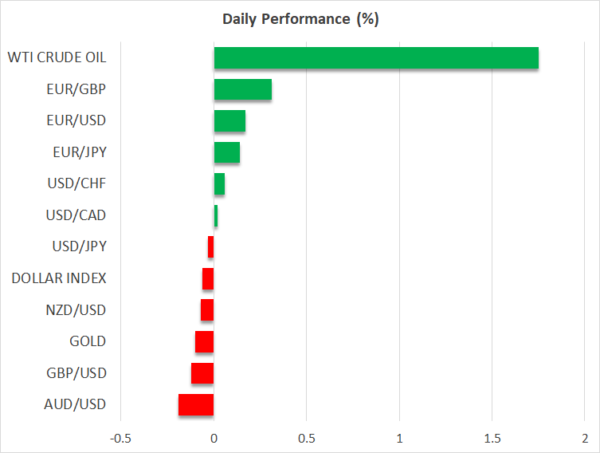- Dollar and stocks firmer, look to Fed speakers and data for momentum, inflation clues
- Euro softer after Lagarde comments, pound slips too
- Metal prices fall again after China warning, aussie struggles
Inflation vs recovery theme
Lingering fears of an upsurge in inflation weighed on sentiment at the start of this week’s trading amid a somewhat quieter day with several European markets closed for a public holiday. The clashing themes of the growing inflation threat and the strengthening global recovery have been aiding both risk and safe assets over the past month, while keeping their gains in check.
However, riskier assets were slightly in favour on Monday as equities in Europe and Asia posted modest gains. US e-mini futures were positive too, adding about 0.4%. The S&P 500 and Nasdaq Composite ended Friday lower, and although the Dow Jones managed to closer higher, all three indices were down on the week.
Markets are becoming increasingly gripped by the threat of higher inflation, spoiling the recovery party on the back of the successful vaccine rollouts in North America and Europe, which is paving the way for major Western economies to reopen. However, the vaccine-led recovery has been priced in for some time now and as growth quickens in more and more parts of the world, it was inevitable that the focus was always going to switch to how soon central banks will start to wind down their virus emergency stimulus.
In particular, the Federal Reserve is under intense scrutiny as policymakers have yet to begin the great taper debate even though the US recovery is the most solid among the big economies and the consumer price index has soared above 4% y/y. Investors will be on the lookout for fresh remarks on tapering by the Fed’s Brainard, Mester and George, who are due to speak later today, as well as awaiting the most important inflation metric – the core PCE price index – that’s out on Friday.
Dollar off lows but bond yields drift lower
The US dollar rebounded on Friday from four-month lows against a basket of currencies but struggled to sustain a positive footing as Treasury yields dipped further, extending the post-FOMC minutes slide. The yield on 10-year Treasuries fell to a one-week low today as the Fed continues to play down tapering speculation.
However, rising doubts about a strong bounce in nonfarm payrolls in May might also be pulling yields lower after an employment survey by the Dallas Fed pointed to a weakening trend for the week of May 9-15.
The not so upbeat survey contrasts sharply with the latest flash PMIs by IHS Markit, which surged in May. Both the manufacturing and services PMIs hit record highs in the preliminary reading, suggesting a booming economy.
Euro claws higher after Lagarde knock
Eurozone PMIs also topped expectations on Friday, propping up the euro, which came under pressure from remarks by ECB President Christine Lagarde. The ECB is set to review its PEPP programme at its June 10 policy meeting and bets that the Bank will signal a slower pace of asset purchases have been rising. However, Lagarde significantly dampened expectations of such a move on Friday, suggesting that it was “far too early” for taper talk.
Nevertheless, the euro reversed back up again on Monday to head for the $1.22 level as Eurozone government bond yields also recovered from their lows.
The pound was marginally lower as traders eyed Bank of England Governor Andrew Bailey’s appearance before a Treasury Select Committee later on for any hints about a further slowdown in QE.
Metal prices may be steadying but aussie remains pressured
Commodity-linked currencies remained under pressure on Monday, although there are some tepid signs that the selloff in commodities is easing. Copper futures edged up from three-week lows brushed earlier today. Industrial metals were hammered last week after China moved to curtail the recent skyrocketing of key industrial commodity prices. Aside from copper, iron ore, coking coal and steel futures also plummeted last week, halting the May rally.
The Australian dollar, which often moves in tandem with metal prices, took a tumble on Friday and hit a 1½-week low earlier in the session, but appears to be stabilizing now. However, in the bigger picture, the aussie has been trading sideways for over a month now, as the weaker US dollar has lessened its downside.
The Canadian dollar was slightly softer too despite oil prices jumping by 2% today. A setback in the Iran nuclear talks is spurring oil futures higher, though hopes of a deal remain high and it could only be a matter of time before a new pact is agreed.


